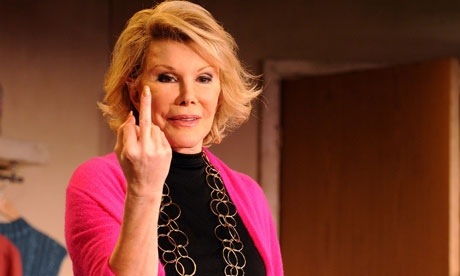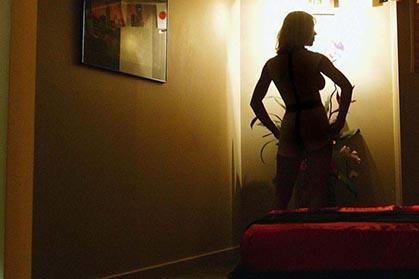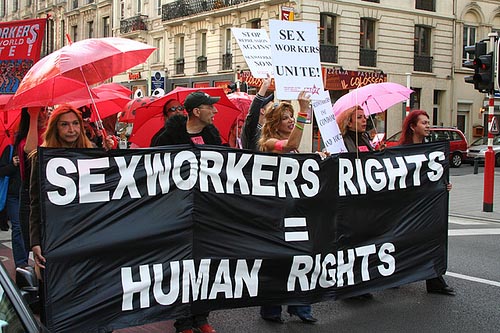If any movement needs satire, it’s feminism. Humour isn’t about appeasing the patriarchy, but rolling over it in an armoured car
Knock, knock. Who’s there? A post-menopausal, differently abled, non-white, cis-woman. Feminism doesn’t always tend to lend itself to comedy. And yet while political satire and alternative comedy have a rich and radical history, there seems to be an emerging critique of combining “fun” with “feminism”. Apparently some of us are hampering the destruction of the patriarchy with fanny jokes.
Ellie Mae O’Hagan recently made an impassioned defence of anger in political movements and the motivating force that it has given historically, and today, to the feminist movement. But she warns against watering this anger down to make it more palatable to a broader audience by making it “funny” and “sexy”. As O’Hagan says: “Sexy, funny feminism is inspired by the fear that feminism will never get anywhere unless it is likable”, and that by trying to please everyone means that you inevitably achieve nothing.
While I entirely agree that social movements need to be radical and challenge the status quo – otherwise they are not movements, just society – to imply that humour undermines a feminist political position or is a mechanism to get people to like you underestimates the power of comedy, satire and knob gags.
There is a conflation of a few issues here; the feeling that some feminists are “appeasing” men or the patriarchy by trying to be liked, that feminists who are funny are not being truly political, and a false dichotomy between humour and anger. In her criticism of “fun feminism”, Julie Bindel is more targeting the tactics and analysis of some within the feminist movement today: those who are slut-walking, producing porn or taking lap-dancing classes; rather than necessarily those who are using humour to puncture injustice.
Indeed as most female comedians will tell you, humour is not necessarily a way to get people to like you, especially men. The hilarious and trailblazing Joan Rivers said in an interview with Dawn French: “Men don’t want you too funny … They’re terrified that you might be smarter than they are, brighter than they are, cleverer than they are, wittier … no I think a man has to be terribly secure.”
Funny women are often not felt to be conventionally attractive. And if there is one thing that women are told to be, it is conventionally attractive. To be funny is to be a smartarse, to be clever, quick and able to take down the bully in the playground or the millionaire in the cabinet. This doesn’t usually mean you are going to be liked by the target of your humour – the politician you satirise or the ex-boyfriend you emasculate. Rather than appeasing the powerful, comedy in the right hands should destroy them, at least for the length of a set.
To consider feminists who are funny as not truly political is to yet again hold women to different standards than men. Has anyone ever said that Mark Thomas or Mark Steele are not political enough because they are comedians? The comedy writer John O’Farrell is currently standing as a Labour candidate in Eastleigh, and comedian-turned-politician Beppe Grillo could form the official opposition in Italy’s parliament. Being funny is part of their politics, and vice versa. Comedians are imprisoned in Burma, cartoonists are arrested for “sedition” in India, and Islamists in Tunisia try and fail to stop students performing and filming a “Harlem shake”. All because in the right hands, comedy can be dynamite under the oppressive backsides of authoritarian groups or regimes – who by definition have absolutely no sense of humour.
It is a totally false dichotomy to pit anger against humour. In Suzanne Moore’s excellent essay on female anger, she chides us because “we cloak our vitriol in humour”. But people are often funny because they are angry. Their comedy amplifies and funnels their anger. The vitriol of Lenny Bruce, Bill Hicks, Richard Pryor, Chris Rock and Doug Stanhope is certainly not cloaked by their humour, but instead it delivers them sell-out audiences drawn to their bile.
While it is entirely legitimate to have a go if someone finds lap dancing to be the height of empowerment, or believes that Emily Wilding Davison died for our right to vajazzle, to criticise a feminist for being too funny too often is to ignore the power of comedy. A power that men have been politically wielding for centuries, though clearly not in the House of Commons.
Humour is anti-establishment. It is powerful, and it is insightful. It won’t in and of itself end racial segregation, or topple a government, but it is a heavily armoured vehicle in your culture war. But if any movement needs a satirist, it’s definitely feminism. At least we’ll have a laugh while we construct the matriarchal utopia.
Source






